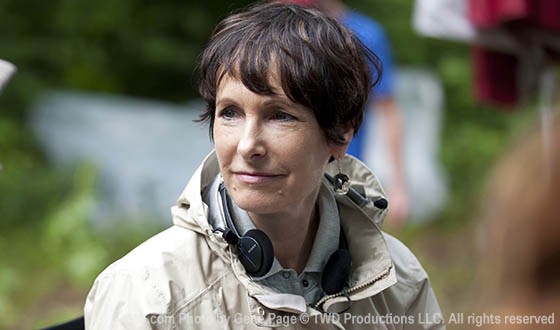Superstar producer Gale Anne Hurd reflected on her three decades in the film and TV business in a Hollywood Masters interview yesterday.
Most famous for her behind-the-scenes contributions to “The Terminator,” “Aliens,” “The Hulk,” and most recently, “The Walking Dead,” Hurd recently received a lifetime-achievement award from the Producers Guild of America. But her road to the top, especially as the rare female in charge of blockbuster productions in the 1980s, was, unsurprisingly, a rocky one.
Hurd discussed the sexism she’d internalized early in life, the misogyny she faced as an emerging woman producer (“How can a little girl like you produce a big movie like this?”), and the discrimination against female filmmakers that she sees still plaguing the industry today.
As a college grad (graduating at the top of her class at Stanford), Hurd found it difficult to reconcile her professional ambitions with the lack of women role models in the film industry:
“This was 1977. There weren’t a lot of female role models. I couldn’t look and say, you know, I want to be like her. So at that time, my ambition was, I could be someone’s secretary, and that would be my job. My mother had been a secretary. … So you know, that was my nepotism, you know, following in the footsteps of my mother and becoming a secretary.”
Hurd battled to produce “Aliens,” whose director, James Cameron, she had promoted and supported on earlier productions. “How can a little girl like you produce a big movie like this?” she recalls being asked about her talents. After acknowledging her relative lack of producing experience at the time, Hurd went to work convincing Fox execs that she was more than qualified for the job:
“How many women are producing films like this? It’s more than double the budget of “The Terminator.” It’s in the studio system, and I said, ‘You know what? Check my references.’ So I said you can call Lindsley Parsons, who was at the completion bond company, Finances, who’d been a huge supporter. You can call Roger Corman. You know, you call Mike Medavoy. Call and see if I know what I’m doing. And then I called my friend, the fantastic, the late Debra Hill, who was an inspiration to me, and I said, ‘Debra, what should I do?’ And if you don’t know her, she co-wrote and produced “Halloween” and, you know, all the early John Carpenter films, and many, many others. Fisher King, you name it. And she said, ‘You know what? You’ll get it and then you’ll prove to them that it was the right decision.’ And what a loss it was to have her pass away. Same with Dawn Steel and Laura Ziskin.”
Asked by her interviewer if the kind of discrimination she faced in the 1980s still afflicts women producers, Hurd was honest: “Now? Less so. Less so for producers, but equally so for directors. … There’s a great deal of reticence giving a woman [director] a chance. And the statistics support that fact.”
Though she declined to propose any solutions to getting more female filmmakers hired — a responsibility that falls outside of her professional purview, though she’s produced films by Karyn Kusama, Lexi Alexander, Naomi Foner, and Valerie Red-Horse in the last ten years — Hurd was quick to point to the bright side for women directors:
“The good news is, look at the number of women who won awards at the DGA Awards. I mean, in television primarily, but Michelle MacLaren, who’s directed in “The Walking Dead.” She was the producing director on “Breaking Bad,” is now doing a new Marvel movie. And I think it will change. Obviously, Kathryn Bigelow. So it now becomes, you know, we can give this woman a chance because she’s proven that it’s a good bet.”
[via Hollywood Reporter]






